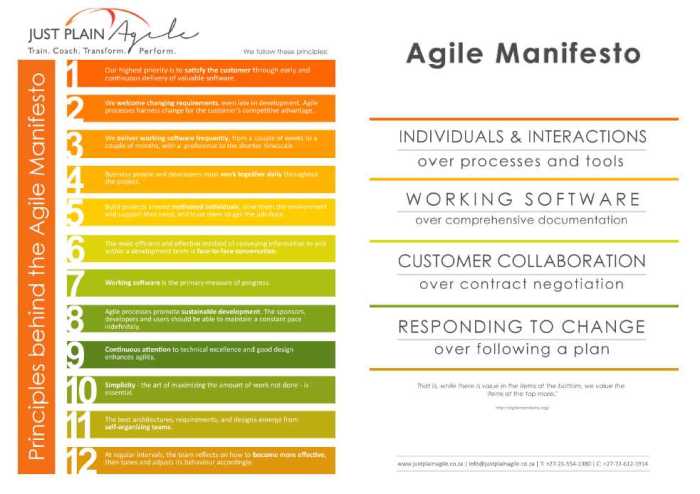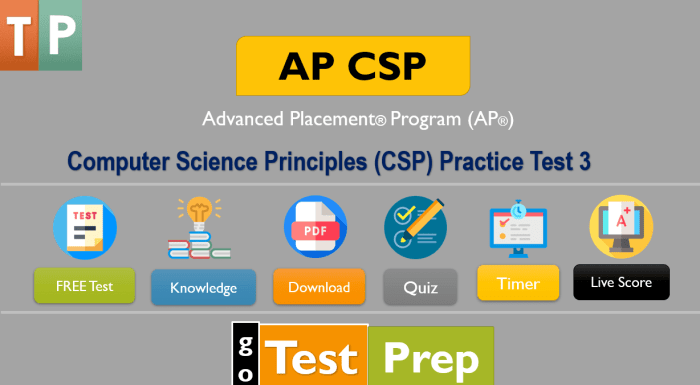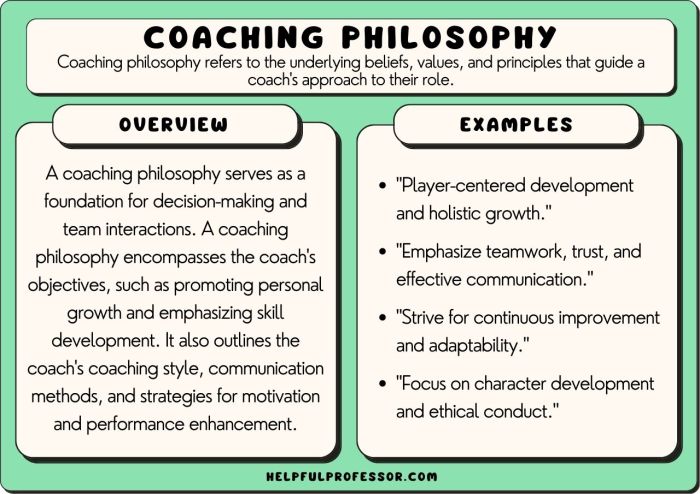Coaching Principles Test Answers PDF: A Comprehensive Guide for Effective Coaching sets the stage for this enthralling narrative, offering readers a glimpse into a story that is rich in detail and brimming with originality from the outset.
This comprehensive guide delves into the fundamentals of coaching principles, empowering readers with the knowledge and skills necessary to excel in the field of coaching. With its engaging writing style and thought-provoking insights, this guide will captivate readers from start to finish.
Coaching Principles Test

Coaching principles tests are assessments designed to evaluate an individual’s knowledge and understanding of the fundamental principles of coaching. These tests provide valuable insights into a coach’s ability to apply coaching techniques effectively and ethically.
There are various types of coaching principles tests available, each with its own focus and level of difficulty. Some tests may assess general coaching principles, while others may focus on specific coaching methodologies or contexts, such as sports coaching or business coaching.
Preparing for a Coaching Principles Test
To prepare effectively for a coaching principles test, consider the following tips:
- Review the test syllabus or guidelines to identify the specific topics and areas of knowledge that will be covered.
- Study reputable coaching resources, such as textbooks, articles, and online courses, to enhance your understanding of the key principles.
- Engage in practice questions or mock tests to familiarize yourself with the format and types of questions that may appear on the test.
- Seek guidance from experienced coaches or mentors who can provide insights and support.
- Manage your time effectively during the test and allocate sufficient time to each question.
Key Concepts in Coaching Principles
Coaching principles form the foundation of effective coaching practices. These principles guide coaches in creating a supportive and empowering environment that facilitates the growth and development of individuals and teams. By adhering to these principles, coaches can foster positive relationships, promote self-awareness, and inspire their clients to achieve their full potential.
Establishing clear goals and objectives is crucial in coaching. Well-defined goals provide direction and focus for both the coach and the client. They serve as a roadmap, outlining the desired outcomes and guiding the coaching process. Clear objectives help track progress, measure success, and maintain accountability.
Role of Communication in Coaching
Communication is the lifeblood of coaching. Effective communication fosters a strong coach-client relationship, facilitates understanding, and enables the exchange of ideas and feedback. Coaches must possess excellent communication skills, including active listening, empathy, and the ability to convey complex ideas clearly and concisely.
Applying Coaching Principles in Practice

Implementing coaching principles in real-world situations requires a nuanced approach that considers the specific context and needs of the individual being coached. By understanding and applying these principles, coaches can create an environment that fosters growth, development, and performance improvement.
Examples of Applying Coaching Principles
- Active Listening:Encourage open communication and demonstrate genuine interest in the athlete’s perspective.
- Goal Setting:Collaborate with athletes to establish specific, measurable, achievable, relevant, and time-bound goals.
- Positive Reinforcement:Acknowledge and reward effort, progress, and achievements, fostering a growth mindset.
- Feedback:Provide constructive and timely feedback that is specific, actionable, and focused on improvement.
- Empowerment:Delegate tasks and responsibilities to athletes, fostering self-confidence and ownership of their development.
Challenges and Opportunities of Implementing Coaching Principles
Implementing coaching principles can present challenges, including resistance from athletes, time constraints, and limited resources. However, these challenges also offer opportunities for growth and adaptation. By addressing resistance through effective communication and relationship-building, coaches can foster a collaborative environment. Time constraints can be overcome through efficient planning and prioritization.
Limited resources can be supplemented through creative problem-solving and collaboration with other professionals.
Evaluating the Effectiveness of Coaching Interventions
Evaluating the effectiveness of coaching interventions is crucial for continuous improvement. Coaches can use a variety of methods, including:
- Athlete Feedback:Gather feedback from athletes on the impact of coaching interventions on their development and performance.
- Performance Data:Track and analyze performance metrics to assess progress towards goals and identify areas for improvement.
- Observations:Conduct regular observations of athletes’ training and competition to evaluate the application of coaching principles.
- Self-Reflection:Coaches should engage in self-reflection to identify areas for growth and improvement in their coaching practices.
Sample Coaching Principles Test Questions: Coaching Principles Test Answers Pdf

Coaching principles test questions assess an individual’s understanding of the fundamental concepts and practices of coaching. These questions can cover a wide range of topics, including the role of the coach, ethical considerations, communication techniques, and planning and evaluation.
The following table provides a sample of coaching principles test questions and answers:
| Question | Answer |
|---|---|
| What is the primary role of a coach? | To facilitate the development and performance of individuals and teams. |
| What are the key ethical considerations for coaches? | Maintaining confidentiality, avoiding conflicts of interest, and respecting the rights of athletes. |
| Describe the importance of active listening in coaching. | Active listening allows coaches to understand the needs and perspectives of their athletes, build rapport, and provide tailored support. |
| How can coaches use goal setting to enhance athlete performance? | Goal setting provides direction, motivation, and a framework for evaluating progress. |
| What are the key principles of effective feedback? | Feedback should be specific, timely, constructive, and focused on improvement. |
Additional Resources
In addition to the information provided in this document, there are numerous resources available to help you learn more about coaching principles. These resources include books, articles, websites, and professional development opportunities.
Here are some of the most popular resources:
Books
- Coaching for Performanceby John Whitmore
- The Coaching Habitby Michael Bungay Stanier
- The Inner Game of Coachingby Timothy Gallwey
Articles
- What Great Coaches Do by Harvard Business Review
- 5 Essential Coaching Principles by Psychology Today
- Basic Coaching Skills by The Balance Careers
Websites
Professional Development Opportunities, Coaching principles test answers pdf
In addition to the resources listed above, there are also a number of professional development opportunities available for coaches. These opportunities include workshops, seminars, and certification programs. Professional development opportunities can help you to improve your coaching skills and knowledge, and can also help you to network with other coaches.
FAQ Insights
What is the purpose of a coaching principles test?
A coaching principles test assesses an individual’s understanding of the core principles and best practices of effective coaching.
What types of coaching principles tests are available?
There are various types of coaching principles tests, including multiple-choice, short answer, and essay-based tests.
How can I prepare for a coaching principles test?
To prepare for a coaching principles test, thoroughly review the key concepts of coaching, practice answering sample questions, and seek guidance from experienced coaches or mentors.